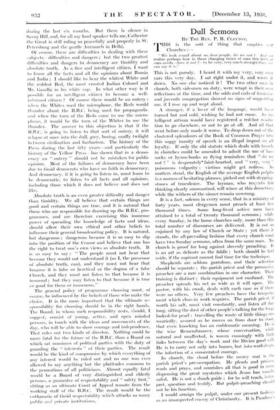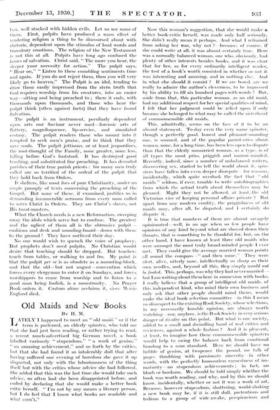Dull Sermons
By TIIE REV. P. B. CLAYTON'.
/1113IS is the sort of thing that 'empties ,uir Churches :— " We look round shout WI, dear people, do we not 9 And se 'realize perhaps how in these changing times of ours this faith of . ours needs—does it not ?—to be very, very much stronger than one .can say it is."
WS is not parody. I heard it with my very, very own
ears this very .day. sat right under it, and wrote it down. No one else noticed it ! The two other men ia church, both sidesmen on duty, were wrapt in their own reflections at the time, and the odds and ends of feminine and juvenile congregation showed no signs of support ing Me, if I rose up and wept aloud.
A stranger, if a. lover of the language, would lin, turned hot and cold, wishing he had not come. An in- telligent artisan would have registered a red-hot resolu- tion to go elsewhere, or not to go at all. And all that went before only made it worse. To drop down out of the clustered splendours of the Book of Common Prayer into this soggy inanity of speech is an illegal impost on all ,loyalty. If only the old statute which deals with brawls in churches could be amended to admit the use of has- socks or hymn-books as flying reminders that "do we not ? " is desperately* faint-hearted, and " very, very " Poisonous vulgarity ; victims might get redress. As matters stand, the English of the average English pulpits is a morass of hesitating phrases, picked out with stepping- stones of truculence. The layman, who resn.lets fair thinking clearly summarized, will wince at this decoction; while the withers of the sinner remain unwrung.
It is a fact, solemn in every sense, that in a ministry of forty years, most clergymen must preach at least live thousand times. Some long-lived active men have attained to a total of twenty thousand sermons ; while every Sunday, in the home churches only, more than this total number of discourses are delivered. It is not so enjoined by any law of Church or State ; yet there it stands, the all-prevailing fashion that every church must have two Sunday sermons, often from the same man. No church is proof for long against slovenly preaching. it is an art as delicate as the fiddle ; both _should be laid aside, if the aspirant cannot find time for the technique.
Shepherds arc. seldom garrulous, and their selection should be separate ; the parish priest mid the persuasive preacher are a rare combination in one character. Their training is distinct ; their equipment not confused. The preacher spreads his net as wide as it will open. The pastor, with Isis crook, deals with each ease as if there were no others. :Very .few preachers have the tempera- ment which close-in work requires.. The parish priest, it worth Isis salt, most visit constantly, and listen all day long, sifting the dust of other people's talking for the long- looked-for pearl : travelling the Waste of little things an- weariedly, assured as he moves on from door to door, that even knocking has an emblematic meaning. Ilea the wise Remembrancer, whose conversation, whil, natural and unaffected, is woven cunningly with little links between the day's work and the Divine good will- He is to carry not only into homes, but into workshops, the infection of.a consecrated courage. In church, the cloud before the mercy seat is 1 ho parish priest's pre-occupation. He pleads and praise,. reads and prays, and nourishes all that is good in men, dispensing the great mysteries which Jesus has VOIICII- safed, He is not a dumb guide ; for he will teach, inter- pret, question and testify. But pulpit-preaching shoulil
not be his function. . -
„ I would arraign the pulpit, under our. present fashiou, as an unsuspected enemy of Christianity. It is Pandora s box, well stocked with hidden evils. Let us see some of them. First, pulpits have produced a mass effect of rendering religion a thing to be discoursed about with rhetoric, dependent upon the stimulus of loud words and transitory emotions. The religion of the New Testament is not this at all. Pulpits have long ago confused the issues of salvation. Christ said, "The more you hear, the deeper your necessity for action." The pulpit says, "Hear on," "Listen to these ennobling sentiments time and again. If you do not reject them, then you will very likely go to heaven." The Pulpit is an idol, tending to draw those easily impressed from the stern truth that God requires worship from his creatures, into an easier Niiiy—sitting and being preached to ; there it ends, with thousands upon thousands, and those who hear the pulpit think (often against facts) that they have found Salvation.
The pulpit is an instrument, peculiarly dependent upon arts our Saviour never used—forensic arts of flattery, magniloquence, lip-service, and simulated ecstasy. The pulpit renders those who mount into it tempted to seek men's praise, and to think that they save souls. The pulpit jettisons, or at least jeopardizes, the root-thought of the Family, none greater, mine less, falling before God's footstool. It has destroyed good teaching, and substituted fine preaching. It has denuded parishes of their true parish priests : for many men truly called are so terrified of the ordeal of the pulpit that they hold back from Orders.
It shelters, like most foes of pure Christianity, under an ample panoply of texts concerning the preaching of the Gospel. But none of these, if examined, justifies us in demanding innumerable sermons from every man called to serve Christ in Orders. They are Christ's slaves, not His toast-masters.
• What the Church needs is a new Reformation, sweeping
ay the idols which serve but to confuse. The greatest and the ugliest of them all is the obtrusive pulpit— cushions and desk and sounding-board—down with them to the ground ! They have outlived their day.
' No one • would wish to quench the voice of prophecy. But prophets don't need pulpits. No Christian would desire that teaching should be dropped. But teachers tettelf from tables, or walking to and fro. My point is that the pulpit per se is as obsolete as a mounting-block, and that the old—but not august—convention which forces every clergyman to enter it on Sundays, and forces Worshippers to cease from worship and to listen to a good man being foolish, is a monstrosity. No Prayer Book orders it. Custom alone acclaims it, since Mirrie England died.















































 Previous page
Previous page